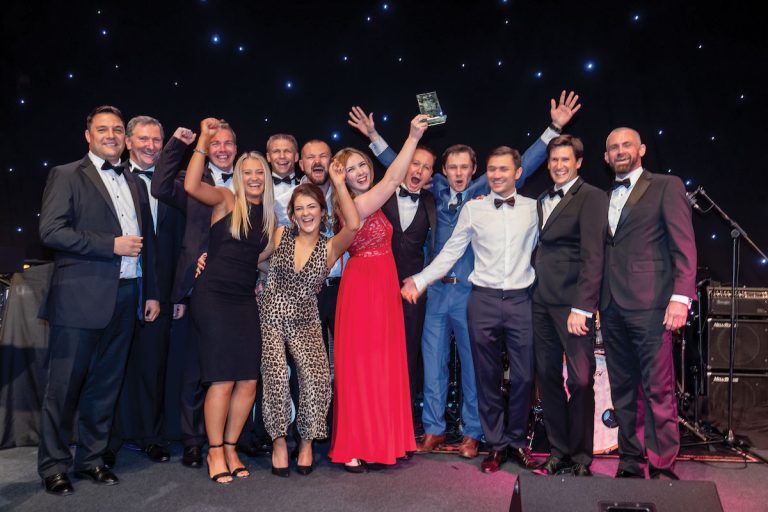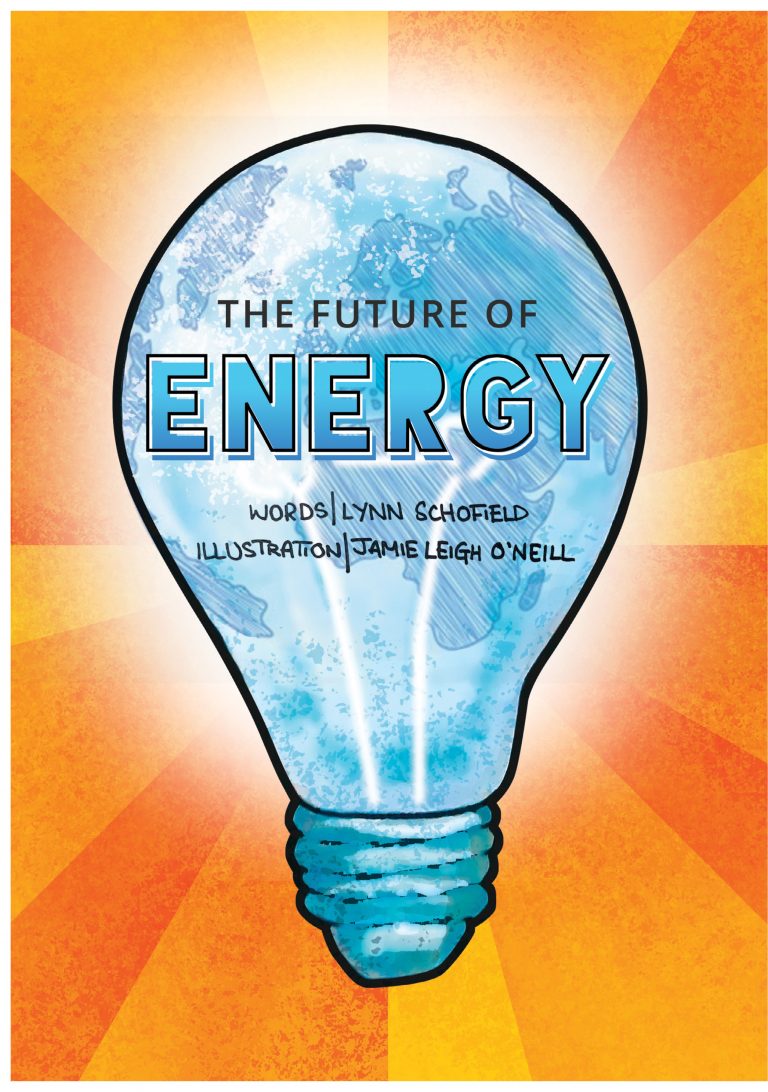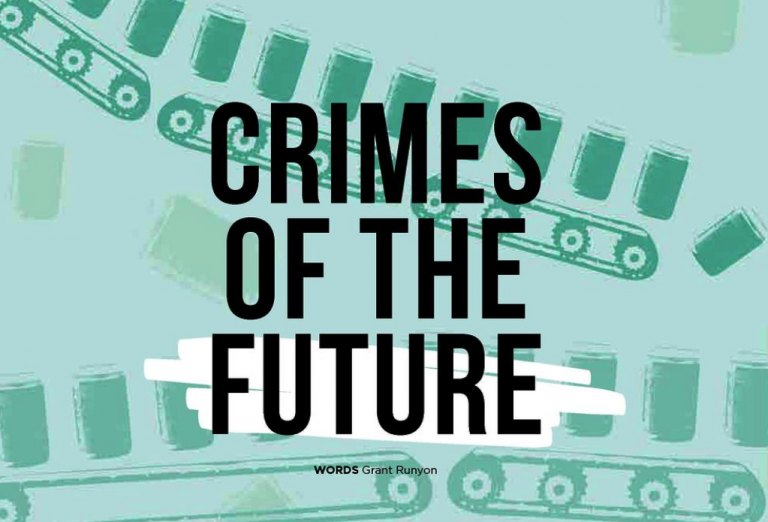Winners of the ICSA Jersey Awards 2018 were celebrated along with the recent academic achievements of ICSA graduates and students at the sell-out black tie ICSA Jersey Annual Dinner. The Awards were judged by a panel of industry experts and the shortlisted nominees included: Accuro Trust (Jersey); Axio Capital Solutions; Aztec Group; Computershare; Consortia Partnership; Estera; First Names; Hawksford; Highvern; Intertrust; Link Asset Services; Mourant Governance Services; Ocorian; Praxis IFM, RBC Wealth Management; and SANNE. There was also a charity draw which raised £2,100.00 for the Jersey Heart Support Group. Images by Gary Grimshaw Photo Reportage.
White Collar Extreme: Get Tough on your CV
Words: Grant Runyon
I’m told that the core skills requirements for landing an office job in Jersey are literacy, numeracy and a clean criminal record. In a well-educated population this does little to narrow down the competition, so as well as promising the interview panel that you definitely haven’t murdered anybody it has become common to be quizzed at length about how your non-work skills translate to the office.
When I was last unemployed this might have been as simple as elaborating on the paragraph tacked on your CV that says you play squash, like reading, or that old classic “socialising with friends,” but competition for today’s best jobs is cut-throat and you’re unlikely to stand out simply by announcing that, yes, you do really enjoy human company when you’re not at work. Instead we’re starting to see the winning candidates stake their claims to the prime positions by demonstrating the career relevance of running a marathon through a desert, deadlifting a Fiat 500, or maybe strangling an adversary to submission with just the muscles in their thighs. I know that Jason-Statham-levels of hardness is a quality I personally demand in the person who administers my mortgage, so it’s good to see management taking an interest in the candidates who aren’t afraid to go that extra mile – especially if that mile is through a filthy ditch covered in barbed wire.
KNOCKOUT CANDIDATE: THE MARTIAL ARTS FAN
When I was growing up, being “into martial arts” meant that you owned a Bruce Lee box set and might have taken a few karate lessons at Fort Regent. Most of the guys who did this grew luxurious pony tails, and it definitely wasn’t something you’d talk about to a prospective employer unless they ran a shop that sold video games or nunchuks. This all changed when Mixed Martial Arts exploded in popularity, uniting fans of boxing, roundhouse kicks and Hulk Hogan in one socially acceptable and Instagram-friendly lifestyle. It’s now unremarkable to make water-cooler conversation about how you spent Saturday night being kneed in the back by a doorman from Bristol, so telling the interview panel that you’re a cage fighter underlines your dedication to dull, painful training as well as a high tolerance to a working environment that runs the risk of permanently damaging your brain. When I’m in a boundary dispute with my neighbours it’s also reassuring to know that my advocate could, if needed, smash a pile of bricks or planks with just a single blow of their fist.
WHAT DO YOU BRING TO THE TEAM? Strong under pressure, know how to exploit weakness, good at ignoring a crowd that might be baying for your blood .
IDEAL JOB: Lawyer – no loyalties in the ring. Will mercilessly inflict pain and damage on their opponent, but will still shake hands with them afterwards.
ADRENALINE JUNKIE: THE EXTREME SPORTS ENTHUSIAST
You would think that somebody who enjoys wingsuit flying or free climbing might not choose to work in an office, but those corporate health plans come in very handy if you’re unlucky over the weekend and your lung gets impaled on a tree branch. There’s also a limit to how much adrenaline most people can take, so a working environment that many of us might consider dull could represent a lovely calm alternative to a person who spends their off-time jumping out of planes or hunting sharks with a speargun. HR professionals have also realised that there’s a kind of Darwinism at work – if you’re into this kind of stuff and still alive you’re probably skilled and organised, or perhaps just lucky. There’s also the chance that these adrenaline seekers might demonstrate the “motorsport effect,” where one of the main skills needed to operate a tiny car at incredibly dangerous speeds appears to be having the off-grid personality of an accountant who likes to spend Saturday night ironing their socks.
WHAT DO YOU BRING TO THE TEAM? An intense understanding of the fine print in insurance liability, the ability to make snap life or death decisions, the hard-won knowledge that man is the deadliest prey of all.
IDEAL JOB: International currency trader – take dangerous gambles at high speeds, try to avoid causing a gigantic crash.
GOING THE DISTANCE: THE ENDURANCE RUNNER
I often liken working life to crawling through a muddy trench, whilst being shouted at by sadists, only to receive a pathetic and ultimately worthless reward at the end. For some people, this is also what they like to do on their days off. Going for a normal run stopped being impressive a few years ago – if you want to stand out you either need to run hundreds of miles in one go, or do a normal distance run in a field that resembles a game show obstacle course themed around the first hour of Saving Private Ryan. With names like Tough Mudder, Nuclear Racing and the Chocolate Starfish Egg and Spoon Race, these feats of mucky endurance are sure to impress management by demonstrating your willingness to endure any amount of filth and punishment if there’s a chance you might come out in first place.
WHAT DO YOU BRING TO THE TEAM: stamina, a degree of masochism, and willingness to crawl through a ditch somebody else has dug for you.
IDEAL JOB: Generic office drone – you don’t ask where you’re going, or why, you just try and get there a bit faster than anybody else.
ELITE CANDIDATE: THE DOOMSDAY SURVIVOR
Most of these activities, whilst extreme, represent a deliberate alternative to the type of comforts we’ve become used to in our daily lives – comforts we’ll happily return to after a measured and character building amount of hardship. There is a much smaller group of people out there who’ll endure every activity on this page – not because they enjoy it, but because they see it as essential training for a grim and uncertain future. They have built their lives around a philosophy that predicts the imminent collapse of human society, and the lack of consensus amongst their ranks over whether this will be caused by climate change, zombies or pandemic flu means they need a preparedness plan for any situation. Having to deal with late accounts and IT problems is unlikely to have much effect on a person whose definition of “calm under fire” refers to their feelings about being shot at by masked goons whilst looting Benest’s of Millbrook. They will definitely work hard in the office, but don’t expect to be invited around for drinks and nibbles because they live in a blacked out bedsit full of machetes and dried foods, and are only working to earn enough money for a down payment on a bunker somewhere in Canada. Never, ever get them involved in a conversation about the ethics of cannibalism.
WHAT DO YOU BRING TO THE TEAM: extreme resourcefulness, cool and composed in the face of certain disaster, the ability to make the best out of any situation (if salt and pepper are available).
IDEAL JOB: Business continuity expert – ensures your invoices will still be sent out whether the delay is caused by rain, snow or the inevitable fall of mankind.
Edito: The Future Edition
The phrase “Live fast, die young and leave a good looking corpse” often gets attributed to James Dean. That’s what I actually thought until I Googled it to check. Turns out that it was Bo Derek’s husband, John Derek, who delivered the line in the film ‘Knock Any Door’. He may not have said it, but I guess at least he lived out the philosophy, crashing his ‘Little Bastard’ Porsche 550 on a California highway at the age of just 24.
It’s all very well being a Rebel without a Cause, but 24 is just too young to go. James had introduced himself to British actor Alec Guinness (Obi Wan Kenobi in the original Star Wars) in Hollywood a week before he died and asked him to take a look at the car in question. Guinness thought the car appeared “sinister”, saying “If you get in that car, you will be found dead in it by this time next week.” Maybe the force WAS with him, right?
It’s a poignant consideration, both with our ‘future’ theme in mind and as I’m about to embark on our tenth Galleryrally, the annual Gallery ‘fundraising adventure’. It’s our tenth event and we’re heading back to Monaco, the destination for our first rally back in 2008. It is fantastic that we’re able to use our shoestring budget to create an event that has raised over quarter of a million pounds for local charities over ten years, but it’s also pretty amazing to think that we’ve been doing it for decade; that’s almost half James Dean’s lifespan.
Fortunately the emphasis of the event is on challenges and seeing beautiful parts of Europe rather than Dean’s thirst for speed. This year’s event has been supported by CPA Global and Lexus, who are supplying us one of their new LC500 Hybrids to put through its eco-centric paces on our way down to the Riviera. I’d like to give a big thanks to Sandrine at Travel Counsellors for helping with our hotel bookings and MyMemory/Feel Unique for giving our ralliers a little something each for their packs. Look out for a write up next month.
Road trips are good for the soul and give you plenty of time to think. Our four day challenge is almost like a stopgap for our ralliers each year to reflect on where they are and what they’re doing in life. It’s the same for me; time to look to the future and make plans. I’ve not given mind to an exact philosophy but rather than go by Dean or Derek, I’ll go by (Ricky) Gervais, who surmised, “You know that old thing, live fast, die young? Not my way. Live fast, sure, live too bloody fast sometimes, but die young? Die old! That’s the way. Not orthodox. I don’t live by ‘the rules’ you know.” Like him or loathe him, he’s got a point. I’ve never really been one for the rules anyway and I want at least another James Dean life-span or two, even if I’m never quite sure what the future holds.
BD
The Future of Energy
WORDS Lynn Schofield
OK, so we’re the sunniest place in the British Isles and we have some of the biggest tidal ranges in the world so why aren’t we getting all our electricity from these “free” sources of generation like everybody else seems hell bent on doing? Because that big nasty monopoly Jersey Electricity won’t let us, isn’t that why? Err . . . no actually. In fact, our little Island is somewhat ahead of the power game when it comes to our electricity supply.
Fact one: Our supply is already virtually decarbonised and is currently 10 times cleaner than the UK’s supply. So while the UK and Europe is desperately striving to reduce carbon emissions by cleaning up its electricity generation, we’ve already done it. Renewables can’t reduce your carbon footprint in Jersey.
Fact two: Our supply is very secure and reliable, not just by offshore island standards; we’re also doing 10 times better than the UK when it comes to power cuts.
Fact three: Already a third of electricity supplied in Jersey is from renewable hydro sources in the form of the La Rance Tidal Barrage and Power Station in France, that 220 million units a year or enough to power 30,000 homes using an average 7,500 units (kWhs) a year.
But enough of facts and figures, what’s going to happen in future? Well, the power players at JE insist they want to get local renewables into the energy mix – they’ve already announced plans to enable ground based ‘solar farms’ on brownfield sites – but it has to be at a fair price for all and that means no subsidies.
The world added 98 gigawatts (GW) of solar last year, over half in China, long the world’s biggest consumer of coal. But many consumers are seeing higher energy bills due to ‘green subsidies’. The UK ‘Big Six’ suppliers have increased retail prices by an average of 24% over the last 18 months. In Jersey, prices have risen just 2% in four years. Germany aims to have 80% of its power from renewables by 2050 but has the highest electricity prices in Europe, with prices on average around 40 percent higher than Jersey. Some scientists believe a 100% renewable world is within grasp. But producing electricity renewably isn’t the problem. Producing it securely and cost effectively when it’s needed most is.
Jersey exceeded its record peak demand three times in one week this year, reaching 178MW on 1 March. Put in perspective, theoretically, even with the most technologically advanced panels, it would take an area of 445 acres, or 356 football pitches, of solar panels, working at full capacity (which is impossible in March) to generate enough power to meet that load. Peak demand occurs around 9.30pm on a winter’s evening and of course in darkness solar panels can’t generate much.
Balancing the grid between supply and demand becomes increasingly challenging with the introduction of intermittent power sources such as wind and solar. The answer lies in storage; stockpiling surplus power when the wind blows and the sun shines to be used when demand peaks when the wind has stopped blowing and the sun stopped shining. But batteries are very costly.
Hydropower is one of the oldest energy storage systems. Reservoirs store rainwater to be released, when needed, to turn electricity-generating turbines. Again, already a third of Jersey’s electricity is from such sources.
Without adequate storage, countries are sharing power by moving it thousands of miles along High Voltage transmission lines. Continental Super Grids of the future could mean solar power from the Sahara being used in European capitals. Here in Jersey, albeit on a small scale, we are already moving low carbon power from its French sources to where it is needed via our three high voltage, undersea supply cables. Known as Normandie 1, 2 and 3, they put Jersey in a unique and enviable position by giving it access to affordable, secure and sustainable sources of electricity. With all those boxes ticked, the suits at JE are now focusing on what they call ‘demand-side’ measures’ because new technology, energy efficiency and demand management will also play an increasing part in both reducing emissions and individual energy bills.
In this respect, we are again ahead of the UK. While the mainland’s Smart Meter roll-out falters, Jersey is in the final stages of an £11m four-year project to provide us all with a Smart Meter linked to an online Smart Account that enables us to monitor our electricity use day by day and identify how changes in consumption behaviours can affect bills.
Going forward, even the way we pay for electricity could change. Bills based on kilowatt hours (units) consumed could be replaced by an ‘energy-as-a-service’ model paid for by monthly subscription. Certainly, in many countries, the energy system of the future won’t look like today’s as electricity producers, consumers and those that do both (“prosumers”) – take advantage of new energy technologies and digital enablers.
The ‘Internet of Energy’ would optimise power generation and demand by ensuring that all grid-connected assets, from nuclear power plants to coffee machines can communicate and interact with one another. To meet surges in demand, for example, at half time during major sporting events when everyone puts the kettle on, fridges and freezers might be run on minimum for 10 minutes to even out the flow of energy. Appliances could be connected to use energy when it’s at it cheapest. Electric vehicle (EV) owners could communicate with energy companies, charge overnight and allow the grid to use the stored electricity at times of higher demand next day.
But all this is being driven by the need to decarbonise. Here in Jersey we’ve already done that. And the only way to reduce emissions further and help to halt runaway climate change is to increase energy efficiency and abandon fossil fuels in favour of electricity for transport (which now accounts for a third of Jersey’s total emissions), heating and cooling our homes and workplaces. Therein lies the Island’s challenge for the future.
Crimes of the Future
WORDS Grant Runyon
If you were alive in the ancient past (the 1980s) you’ll remember Jersey’s reputation as the crime capital of Britain. Following the infiltration of BBC Drama by sleeper agents from Guernsey’s propaganda department, our Island home was consistently slandered as a depraved cesspit of vice, murder and … antique teapots.
To their dismay the plot known as “Operation Bergerac” would backfire spectacularly on the boys from St Peter Port, by convincing millions of tourists that Jersey was perpetually sunny as well as sexy and a bit dangerous. Via interminable midday repeats our reputation is somehow still preserved in the semi-glamorous 80s, like a Jurassic Park mosquito in amber. This appeal perseveres even if today’s dedicated Bergerac viewers would doubtless keel over if they as much as glimpsed a lacy bra, and Jersey hasn’t experienced a genuine crimewave since a spate of Halloween eggings in 2006.
If only we could remain in the low-crime paradise of our colour saturated past. We’ve been fortunate that the Island has been insulated from big city wrongdoing, the kind you get outside St Mary’s Village, but technology means that we’re now connected to the global village and it doesn’t have such a sensible speed limit. The days ahead of us bring culture, knowledge and opportunity, but also exposes us to types of lawbreaking that twenty years ago would have been unthinkable even in the wildest Guernsey fantasies. Padlock your door, renew your antivirus, and read on for a low-tech preview of the wide world of high-tech crime.
Dislike! Future crime: social media character assassination
For most of Jersey’s history, if somebody wanted to make you look bad they had to do it at the local pub, or perhaps walk door-to-door telling stories about how you think you’re too good for your own cousins. Thanks to the internet, anybody from any Parish can do this – and a lot worse besides. Hijacking, manipulating or besmirching our online identity is already a problem today, but leaving your phone unlocked and finding your profile picture has been replaced with a dog’s winkie will seem trivial next to what the future holds in store. Imagine if hackers could seize control of your accounts, using them to leave bitchy comments on your friends’ selfies, to insult their pets and babies, and perhaps to post digitally altered media where you hide racism or even (gasp!) give away spoilers to Game of Thrones. Your life would be OVER – shunned like a medieval plague-sufferer in real life and forced to eke out a miserable online life on whatever the future equivalent of LinkedIn is. The alternative? Pay off the hackers in BitCoin, which in the future you’ll be earning by sending foot pictures to kinky Russian billionaires. You won’t be able to bribe them with your normal wage, because Amazon will only be paying you in nutrient shakes and electricity, earned via ten hour days writing five-star reviews of socks.
Extreme brand loyalty! Future crime: corporate payback
In the future the likes of Facebook, Disney and Apple won’t just be our entertainers and employers, they will expand from supplying computers and video to delivering our roads and schools. Although obscenely powerful, these corporate behemoths will continue to compete for our favour, which will be great when it gives you a 5% discount on nutrient shakes, but not so great when it gives them the opportunity to punish us for disloyalty. Wrote a bad review of Amazon’s socks? Maybe local businesses might stop taking your credit. Didn’t feel like sharing a video Facebook made to celebrate the anniversary of your arranged marriage to one of its shareholders? Your next trip to the dentist might result in a few more mistakes and a little less anaesthetic. Watched an illegal stream of the latest Star Wars film? Better hope the iCops arrive before Disney’s Avengers-branded robot bulldozers do. For three hours of pixellated Yoda they’ll happily destroy the hovel your family leases in the polluted badlands south of NewsCorp’s pornography mills.
Ouch! Future crime: medical malpractice
My cousin’s cousin’s mate’s mate knew a guy who got really drunk whilst on an exotic holiday in the Far East. The last thing he remembers is accepting a free drink from a mysterious lady, only to wake up twelve hours later in a bath of ice on Gorey pier, missing a kidney, a lung, a testicle and three fingers. This won’t be as much of a problem in the future, because if you’re over thirty all your organs will be on loan from the Apple hospital and trackable via the same technology used in “Find my iPhone”. A replacement heart (Beats by Dre) will be included in your contract. What you will need to worry about is criminals who steal your entire DNA in order to clone your body in a lab, just so it can wake up twenty minutes earlier than you each day and make off with your daily ration of nutrient shakes. You’ll need to ambush the clone, overpower it and put it to work as a semi-sentient selfie stick. If you get enough likes you might even be able to crowdsource the money to buy your DNA back from eBay.
Game over, man! Future war crime
The future will be one where heartless mega-corporations compete for our loyalty, but like any competition there’s always a chance this could spill over into the only honest form of rivalry: warfare. Conflict will erupt without warning, like filthy popup ads, and will make use of the full horrors of technology, although the corporations will try their best not to damage the infrastructure that survivors will use to rebuild the sock review-based economy. With the absence of any civilian government to protect consumers it’s likely that your best shot at safety is being drafted in to do any meat-reliant fighting tasks that can’t be accomplished by an army of autonomous AI delivery drones. Imagine some of that humorous viral footage of a robot getting stuck on some stairs, except the robot has been programmed to laser your family because they refused to download Chrome “for a smoother (and less fatal) web browsing experience.” It’s not so humorous when you’re snagging Wall-E with your bedsheets and smashing his cloned brain in with a micro scooter.
You’ll be fighting for your life in the Disney streets, pursued by hordes of Facebook terminators, but also fighting for likes – as warfare will also be live-streamed and monetised for the viewing pleasure of audiences outside the conflict zone. Imagine the “thumbs up/thumbs down?” part from roman gladiators, but operated by the merciless whims of social media. The winners will be rewarded with temporary celebrity, gift certificates and increased bandwidth. The losers? In the future the biggest crime is waste, so if you want to keep enjoying those nutrient shakes please don’t ask too many questions about where the protein comes from.
Weekender Festival | 2nd September
The second Weekender festival took place in near perfect conditions this year. At near sell out, the festival is now Jersey’s largest music and entertainment event, bringing world class entertainment to the Showground. This year saw Rag’n’Bone Man, Rita Ora, Dizzie Rascal and Sister Sledge among a diverse range of entertainment wowed crowds. Photographer Simon Roper was snapping the event and got some great shots of some of the people who were working and who made the event.
Citizen’s Advice Bureau 40th Anniversary | 15th September
Last month the Citizen’s Advice Bureau threw a Birthday party at Government House to mark 40 years of being in Jersey. An afternoon tea took place for 100 guests, made up mostly of staff and Volunteers from the last 40 years. The CAB were delighted to have a personal video from Martin Lewis from the Money Show congratulated on their achievements. The Jersey Youth Instrumental Band played on arrival and the event finished up with singing the fabulous Hot Bananas.
Redwood Offshore 1st Anniversary Party | 19th September
Redwood Offshore Limited’s Jersey office marked its 1st Anniversary party at the Radisson Blu Waterfront hotel last month with the launch of its innovative digital AML/CFT training platform. This exciting, unique product focuses specifically on Jersey regulations with further iterations in the pipeline. Attendees enjoyed a demonstration of the system by Andrew Clements of Edease, an award winning technology and education company of which Redwood is in partnership with.
Quilter Cheviot New Office Launch Party | 6th September
Quilter Cheviot Investment Management has relocated from The Parade to Windward House, La Route de la Liberation in St Helier. The team welcomed 150 guests to the new office to celebrate its opening. Head of International & Jersey Office, Tim Childe, said: “We are really pleased to have moved into Windward House, it is a delightful building, ideally located in the island’s financial hub. The relocation reflects the growing demand for our service both locally and internationally. We look forward to welcoming our clients and professional connections in the near future.”
FCM Trust Client Event | 19th September
FCM Trust hosted a client evening last month at the beautiful 16 New Street. The independent, family run business who focus on personal and efficient delivery of fiduciary services wanted to get clients and stakeholders together to celebrate their ongoing relationships, thank existing service providers and increase their visibility on the island. What better way to do it than casual drinks in Georgian splendour!















































